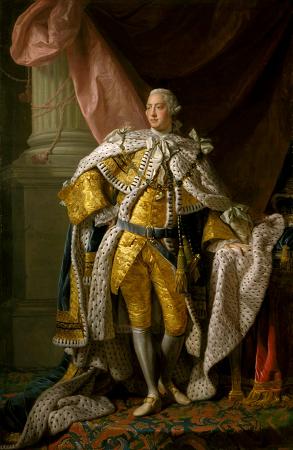George III (1738 - 1820). George III was King of Great Britain and King of Ireland from 25 October 1760 until the union of the two countries on 1 January 1801, after which he was King of the United Kingdom of Great Britain and Ireland until his death in 1820. He was concurrently Duke and prince-elector of Brunswick-Lüneburg in the Holy Roman Empire before becoming King of Hanover on 12 October 1814. He was the third British monarch of the House of Hanover, but unlike his two predecessors, he was born in Great Britain, spoke English as his first language, and never visited Hanover. George's life and reign, which were longer than those of any of his predecessors, were marked by a series of military conflicts involving his kingdoms, much of the rest of Europe, and places farther afield in Africa, the Americas, and Asia. Early in his reign, Great Britain defeated France in the Seven Years' War, becoming the dominant European power in North America and India. However, many of Britain's American colonies were soon lost in the American War of Independence. Further wars against revolutionary and Napoleonic France from 1793 concluded in the defeat of Napoleon at the Battle of Waterloo in 1815. In the later part of his life, George had recurrent, and eventually permanent, mental illness. Although it has since been suggested that he had bipolar disorder or the blood disease porphyria, the cause of his illness remains unknown. After a final relapse in 1810, a regency was established. His eldest son, George, Prince of Wales, ruled as Prince Regent until his father's death, when he succeeded as George IV. Historical analysis of George III's life has gone through a kaleidoscope of changing views that have depended heavily on the prejudices of his biographers and the sources available to them. George was born in London at Norfolk House in St James's Square. He was the grandson of King George II, and the eldest son of Frederick, Prince of Wales, and Augusta of Saxe-Gotha. As he was born two months prematurely and thought unlikely to survive, he was baptised the same day by Thomas Secker, who was both Rector of St James's and Bishop of Oxford.One month later, he was publicly baptised at Norfolk House, again by Secker. His godparents were King Frederick I of Sweden, his uncle Frederick III, Duke of Saxe-Gotha, and his great-aunt Sophia Dorothea, Queen in Prussia. Prince George grew into a healthy but reserved and shy child. The family moved to Leicester Square, where George and his younger brother Prince Edward, Duke of York and Albany, were educated together by private tutors. Family letters show that he could read and write in both English and German, as well as comment on political events of the time, by the age of eight. He was the first British monarch to study science systematically. Apart from chemistry and physics, his lessons included astronomy, mathematics, French, Latin, history, music, geography, commerce, agriculture and constitutional law, along with sporting and social accomplishments such as dancing, fencing, and riding. His religious education was wholly Anglican. At age 10, George took part in a family production of Joseph Addison's play Cato and said in the new prologue: What, tho' a boy! It may with truth be said, A boy in England born, in England bred. Historian Romney Sedgwick argued that these lines appear to be the source of the only historical phrase with which he is associated. King George II disliked the Prince of Wales, and took little interest in his grandchildren. However, in 1751 the Prince died unexpectedly from a lung injury at the age of 44, and his son George became heir apparent to the throne and inherited his father's title of Duke of Edinburgh. Now more interested in his grandson, three weeks later the King created George Prince of Wales. In the spring of 1756, as George approached his eighteenth birthday, the King offered him a grand establishment at St James's Palace, but George refused the offer, guided by his mother and her confidant, Lord Bute, who would later serve as Prime Minister. George's mother, now the Dowager Princess of Wales, preferred to keep George at home where she could imbue him with her strict moral values. In 1759, George was smitten with Lady Sarah Lennox, sister of Charles Lennox, 3rd Duke of Richmond, but Lord Bute advised against the match and George abandoned his thoughts of marriage. I am born for the happiness or misery of a great nation, he wrote, and consequently must often act contrary to my passions.
more...







